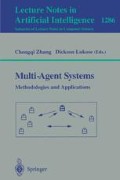Abstract
This paper presents the CoMoMAS methodology and environment for the development of multi-agent systems. We use a conceptual model set to describe a multi-agent system under different views. These models are derived from the knowledge-engineering methodology CommonKADS. In contrast to CommonKADS, our approach takes several agent-specific aspects into consideration, in particular, the use of additional knowledge structures and their flexible representation to guarantee an agent's autonomy at execution time. A knowledge engineering environment has been conceived to demonstrate the feasibility of this conceptual approach. Conceptual models are represented in an extended version of the Conceptual Modeling Language (CML).
Preview
Unable to display preview. Download preview PDF.
References
Thomas Berlage. Object-oriented application frameworks for graphical user interfaces: the GINA perspective. Gesellschaft für Mathematik und Datenverarbeitung, München, Wien, Oldenbourg, 1993.
F. Brazier, B. Dunin-Keplicz, N. Jennings, and J. Treur. Formal specification of multi-agent systems: a real-world case. In Proc. 1 st ICMAS, San Francisco, California, 1995.
F.M.T. Brazier, C.M. Jonker, and J. Treur. Formalisation of a cooperation model based on joint intentions. In ECAI-96 workshop on ATAL, pages 141–155, Budapest, Hungary, 1996. LNAI Series, 1193.
R.A. Brooks. Intelligence without reason. A.I. Memo 1293, MIT, AI Lab., 1991.
R. Conte and C. Castelfranchi. Cognitive and Social Action. UCL Press, 1995.
O. Corby and R. Dieng. Cokace: A centaur-based environment for commonkads conceptual modelling language. In Proc. 12 th ECAI, pages 418–422, Budapest, Hungary, 1996.
J. Cuena. Knowledge-oriented application development: Lessons learnt from real-time decision support systems. In Proc. 12 th ECAI, pages 711–714, Budapest, Hungary, 1996.
W. Van de Velde. Design model and process. Technical Report KADS-II/M7/VUB/RR/064/2.1, ESPRIT Project P5248 KADS-II, 1994.
R. Dieng. Agent-based knowledge acquisition. In Proc. 8 th European Knowledge Acquisition Workshop, pages 63–82, Hoegaarden, Belgium, 1994.
M. D'Inverno and M. Luck. Formalising the contract net as a goal-directed system. In Proc. 7 th MAAMAW, pages 72–85, Eindhoven (NL), 1996. LNAI Series, 1038.
J. Ferber and A. Drogoul. Using reactive multi-agent systems in simulation and problem solving. In N.M. Avouris and L. Gasser, editors, Distributed Artificial Intelligence: Theory and Practise, pages 52–80. Kluwer Academic Publishers, 1992.
K. Fischer, J.P. Müller, M. Pischel, and D. Schier. A model for cooperative transportation scheduling. In Proc. 1 st ICMAS, pages 109–116, San Francisco, California, 1995.
S. Franklin and A. Graesser. Is it an agent, or just a program?: A taxonomy for autonomous agents. In ECAI-96 workshop on ATAL, pages 21–36, Budapest, Hungary, 1996. LNAI Series, 1193.
N. Glaser. Contribution to Knowledge Acquisition and Modelling in a Multi-Agent Framework — The CoMoMAS Approach. PhD thesis, U. Henri Poincaré, Nancy I, 1996.
N. Glaser, V. Chevrier, and J.-P. Haton. Multi-agent modeling for autonomous but cooperative robots. In Proc. 1 st DIMAS, pages 175–182, Cracow, Poland, 1995.
N. Glaser and J.-P. Haton. Flexible and adaptive problem-solving in robot navigation. In Proc. 1 st DIMAS, pages 167–174, Cracow, Poland, 1995.
N. Glaser, M.-C. Haton, and J.-P. Haton. Models and knowledge acquisition cycles for multi-agent systems. In Proc. of 9 th KAW, pages 24/0–20, Banff (CAN), 1995.
N. Glaser and Ph. Morignot. The reorganization of societies of autonomous agents. In Proc. 8 th MAAMAW, Ronneby (S), 1997. LNAI Series. (forthcoming).
J.P. Haton, N. Bouzid, F. Charpillet, M.C. Haton, B. Lâasri, H. Lâasri, P. Marquis, T. Mondot, and A. Napoli. Le raisonnement en intelligence Artificielle. Inter-edition, 1991.
B. Hayes-Roth, K. Pfleger, Ph. Lalanda, Ph. Morignot, and M. Balabanovic. A domain-specific software architecture for adaptive intelligent systems. IEEE Transactions on Software Engineering, v(n), 1995.
C.A. Iglesias, M. Garijo, J.C. Gonzàlez, and J.R. Velasco. A methodological proposal for multiagent systems development extending commonkads. In Proc. of 10 th KAW, Banff (CAN), 1996.
E.A. Kendall, M.T. Malkoun, and C.H. Jiang. A methodology for developing agent based systems. In Distributed Artificial Intelligence — First Australian Workshop on DAI, pages 85–99, Canberra, November 1995. Lecture Notes in Computer Science.
D. Kinny and M. Georgeff. Modelling and design of multi-agent system. In ECAI-96 workshop on ATAL, pages 1–20, Budapest, Hungary, 1996. LNAI Series, 1193.
M. Luck and M. D'Inverno. A formal framework for agency and autonomy. In Proc. 1 st ICMAS, San Francisco, California, 1995.
M.J. Matarić. Interaction and Intelligent Behavior. PhD thesis, Massachusetts Institute of Technology, 1994.
T.A. Montgomery and E.H. Durfee. Using MICE to study intelligent dynamic coordination. In Proc. 2 nd IEEE Conf. on Tools for AI, pages 438–444, 1990.
A. Newell. The knowledge level. Artificial Intelligence, 18:87–127, 1982.
G. Schreiber, J. Breuker, B. Biedeweg, and B.J. Wielinga, editors. KADS — A Principled Approach to Knowledge-Based System Development. Academic Press, 1993.
G. Schreiber, B.J. Wielinga, J.M. Akkermans, W. Van de Velde, and A. Anjewierden. CML: The CommonKADS conceptual modelling language. In Proc. 8 th European Knowledge Acquisition Workshop, pages 1–25, Hoegaarden, Belgium, 1994. LNAI Series, 867.
G. Schreiber, B.J. Wielinga, R. de Hoog, H. Akkermans, and W. Van de Velde. Commonkads: A comprehensive methodology for KBS development. IEEE Expert, 9(6):28–37, 1994.
From Agent Theory to Agent Construction: A Case Study. M. luck and n. griffiths and m. d'inverno. In ECAI-96 workshop on ATAL, pages 50–63, Budapest, Hungary, 1996. LNAI Series, 1193.
A. Waern and S. Gala. The CommonKADS agent model. Technical Report KADS-II/M4/TR/SICS/002/V.1.1, ESPRIT Project P5248 KADS-II, 1993.
M. Woolridge and N.R. Jennings. Agent theories, architectures, and languages: A survey. In Proc. Workshop 7 at 11 th ECAI, pages 1–32, Amsterdam (NL), 1994.
Author information
Authors and Affiliations
Editor information
Rights and permissions
Copyright information
© 1997 Springer-Verlag Berlin Heidelberg
About this paper
Cite this paper
Glaser, N. (1997). The CoMoMAS methodology and environment for multi-agent system development. In: Zhang, C., Lukose, D. (eds) Multi-Agent Systems Methodologies and Applications. DAI 1996. Lecture Notes in Computer Science, vol 1286. Springer, Berlin, Heidelberg. https://doi.org/10.1007/BFb0030078
Download citation
DOI: https://doi.org/10.1007/BFb0030078
Published:
Publisher Name: Springer, Berlin, Heidelberg
Print ISBN: 978-3-540-63412-6
Online ISBN: 978-3-540-69540-0
eBook Packages: Springer Book Archive

